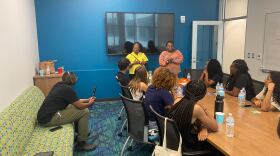A study from N.C. State University and the University of Chicago has found that exposure to racial discrimination is connected to the willingness of black teens and young adults to engage in activism.Lead author Elan Hope is an assistant professor of psychology at State. She and her colleagues surveyed 888 black youth ages 15 to 29.
Those who reported more instances of cultural discriminationÔÇösuch as hearing offensive jokesÔÇöare more likely to engage in low risk activism, such as signing a petition, according to the survey. But those who experience more institutional discriminationÔÇöseeing white students receive preferential treatment in school, for exampleÔÇöare more likely to engage in high-risk activism, and actions that might get them arrested.
When black youth have a better grasp of the reality of race and racism, they're more likely to stand up for their own interests and the interests of their communities. -Elan Hope
There were exceptions to the trends in the report: black youth who reported more experiences of institutional racism were less likely to bother with low-risk activism. Meanwhile, those who reported public regardÔÇöthese youth said they thought the public had a favorable view of black AmericansÔÇöwere not more likely to engage in high-risk activism.
Hope said young black people experience their racial identities differently.
"While several people might notice the same cultural racism in our society, they may interpret that differently, which will have a unique impact on the actions that they decide to take later," she said.
Hope acknowledges that the American political landscape is deeply polarized and points to . She said community organizations can use this information to helping equip black youth with skills and knowledge to advocate for themselves they can have better, healthier lives and seek justice for themselves and their communities.
"Programs, families and community organizations need to purposely engage youth in critical conversations that help them process their racial identities, that help them understand who they are with regard to race and who they are with regard to the racial structures in our society that disenfranchise them," Hope said.
Hope and her colleagues' paper was published this month in the the .










